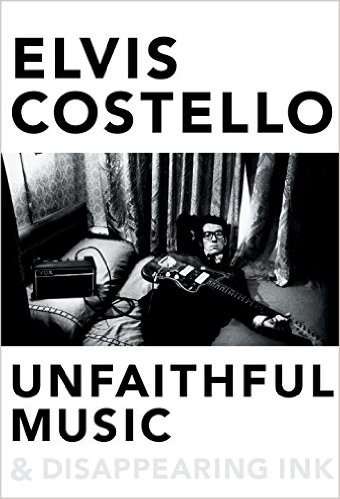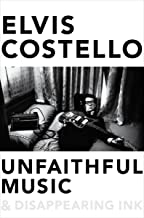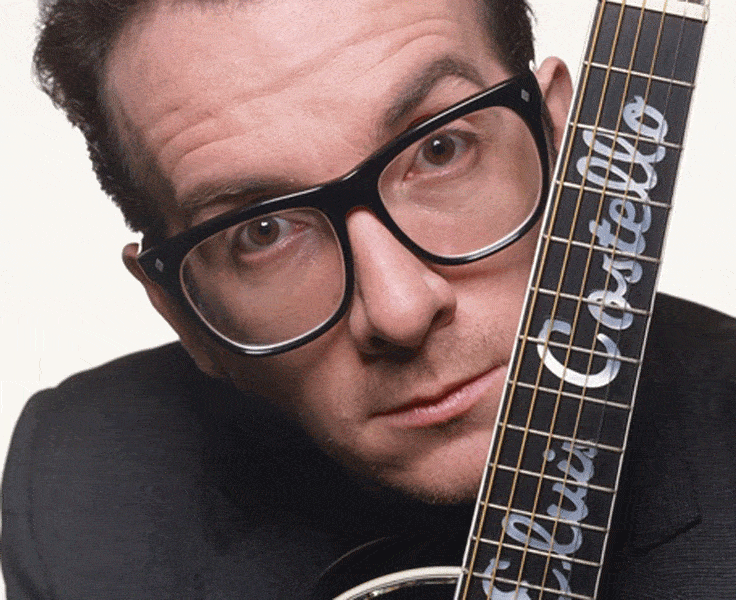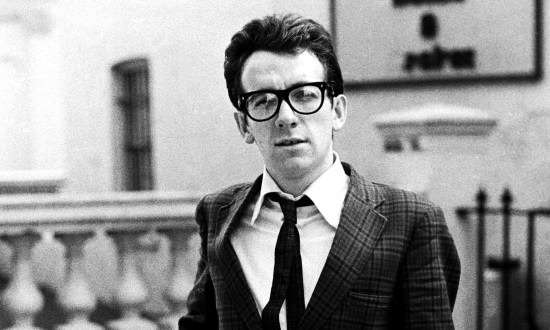Unfaithful Music & Disappearing Ink by Elvis Costello
There may be more famous rock performers, there may be bands that pack larger venues and whose albums outsell his, but for my money, the absolute pinnacle of cool in the world of modern music is Elvis Costello.
Darkly humorous and slightly dangerous, simultaneously catchy and cerebral, his songs helped form the foundation of the punk movement in the 1970s. Through nearly four decades since then, his music spanned a broad variety of genres, from jazz to classical to soul to pop to country to orchestral. His work has won him multiple awards, landed him in the Rock and Roll Hall of Fame, and placed him on Rolling Stone’s list of the 100 Greatest Artists of All Time. And the man himself is a living popular culture encyclopedia, one whose dexterity with language is as powerful and idiosyncratic as it is unique.
 Now, the same linguistic skill that’s created 30 albums and nearly 400 songs has been put to service in Costello’s long-awaited memoir of music, family and modern pop history, Unfaithful Music & Disappearing Ink (Blue Rider Press, 2015).
Now, the same linguistic skill that’s created 30 albums and nearly 400 songs has been put to service in Costello’s long-awaited memoir of music, family and modern pop history, Unfaithful Music & Disappearing Ink (Blue Rider Press, 2015).
Like most Americans, my first impression of Costello was as a loud, brash, New Wave front man who played his songs as fast as he could while seemingly having some sort of seizure on stage. Unfaithful Music traces his journey from a son of a dance-band vocalist raised in London and Liverpool to that dynamic, explosive performer.
Before finding fame, Costello (born Declan Patrick MacManus) wrote songs in the dead of night, formed a band that saw little success and made solo appearances in any place that would have him. One of those songs was, ironically, a ballad that would become one of his first and most memorable hits. “When it came time to write and sing ‘Alison,’” Costello writes, “I knew that I’d never create a beautiful sound, as I was very obviously a mere mortal, unlike Marvin Gaye or Al Green or Philippe Wynne of the Detroit Spinners, as we knew them in England.
“I believed that ‘Alison’ was a work of fiction, taking the sad face of a beautiful girl glimpsed by chance and imagining her life unraveling before her,” he writes. “I have no explanation for why I was able to stand outside reality and imagine such a scene as described in the song and to look so far into the future, or what in the world would make me want this terrible prediction to become true or become untrue.”
He describes in detail the 1977 stunt, broadcast on live television, which would help him make his mark in America. Two lines into performing his newest single “Less than Zero” on Saturday Night Live, Costello turned to his band, the Attractions, pulled the piece to a halt, and told the television audience, “I’m sorry ladies and gentlemen, there’s no reason to do this song.” He then launched into a frenetic performance of his older hit, “Radio Radio.”
“There was panic on the studio floor,” Costello writes. “We were not even certain if we were still on the air, but the light on the central camera stayed on through the first verse and my eyes darted around looking for signs that someone was still calling the shots.” The stunt would get Costello banned from Saturday Night Live for years. Over time, however, it became one of the show’s most memorable moments—so much so that producer Lorne Michaels invited Costello back to recreate it with the Beastie Boys on the SNL’s 25th anniversary special.
The book follows Costello’s career, warts and all (“A lot of people have got spoilt and ruined by sudden success and pushing too hard,” he writes. “I thought I was an exception but I wasn’t as smart or in control as I thought I was.”). It describes his subsequent collaborations with musicians such as Paul McCartney, Burt Bacharach, T-Bone Burnett, Tony Bennett, Bob Dylan, Alan Toussaint, Spinal Tap, the Roots, and the Brodsky Quartet. It examines his work on television and his show Spectacle, on which he interviewed notable guests including Sir Elton John, President Bill Clinton, Lou Reed, Smokey Robinson and Bruce Springsteen. And it highlights a remarkable new chapter in Costello’s personal life, in which he marries world-renowned jazz artist Diana Krall.
But most of all, Unfaithful Music explores the private and emotional foundation of Costello’s remarkable work as a songwriter and performer. In the end, the book becomes a work of art in its own right, as well as a document of an extraordinary cultural era, all created by a singular wordsmith. Once again, Costello proves to be the coolest musician in the room, and an artist worthy of our attention.
Buy this Book!
Amazon





